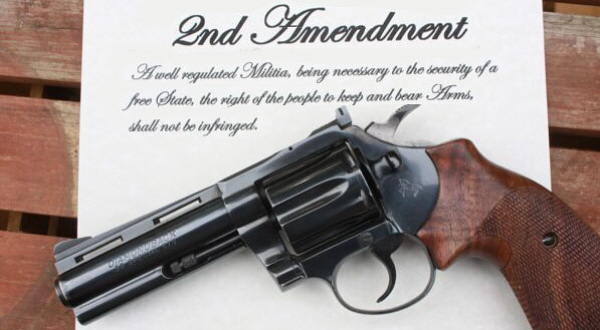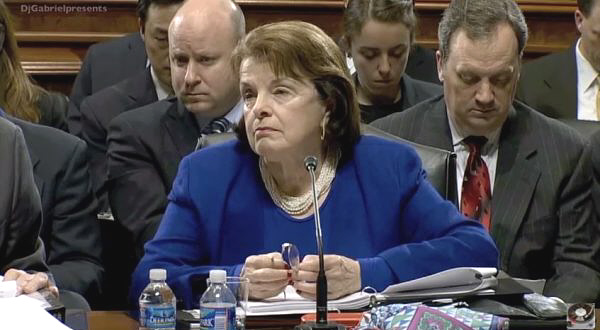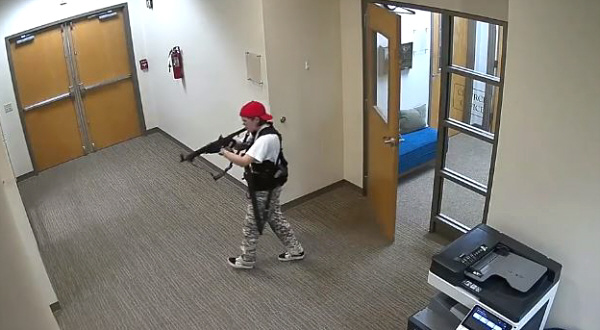

Biggest Gun Rights Stories of 2023 (3 Parts)

The passage of permitless carry laws is poossibly the biggest gun rights story of 2023
By Dave Workman. Dec 26, 2023
Article Source
Quite possibly the biggest gun rights story of 2023 was the advancement of permitless—also called "constitutional"—carry to now cover 27 of the 50 states, creating a majority situation, as noted by Fox News, which makes the gun prohibition lobby furious.
On their website, Brady United declares, "This decision is dangerous and an unprecedented change to centuries of practice and regulation. Lower courts now have more power to strike down gun laws, due to the Supreme Court's ruling that history and tradition should be the sole factors in determining whether or not a law is consistent with the Second Amendment. This test could lock the United States into the past, at a time when people of color, women, and others were not allowed to participate in the political process and when assault weapons were not yet in existence."
Translation: Permitless carry is somehow tantamount to racism and sexism.
Another argument from the Brady camp is that "constitutional carry" leads to more crime committed by people who carry guns without getting a permit or license. The argument ignores the fact that criminals have been doing exactly that for generations, because criminals do not bother with such things as carry permits, background checks, waiting periods or any other roadblocks anti-gunners have put in the way of law-abiding citizens.
One Op-Ed writer in Florida asserted last month that permitless carry is unconstitutional.
This year, the states of Georgia, Florida and Nebraska—all with Republican governors and GOP-controlled legislatures—joined the ranks of constitutional carry states. For the gun prohibition lobby it was a major defeat.
When the U.S. Constitution was ratified, there were no carry permits or licenses. It was actually commonplace for citizens to be armed, or have guns close at hand. As noted by the Fox News article, nobody needed to ask the government for permission to have a gun, or carry one.
Today, these states have permitless carry: Alabama, Alaska, Arizona, Arkansas, Florida, Georgia, Idaho, Indiana, Iowa, Kansas, Kentucky, Maine, Mississippi, Missouri, Montana, Nebraska, New Hampshire, North Dakota, Ohio, Oklahoma, South Dakota, Tennessee, Texas, Utah, Vermont, West Virginia and Wyoming. Among them, Vermont is the one state which has always had permitless carry, and when the movement to do away with licenses and permits first began several years ago, gun rights activists routinely referred to "Vermont-style carry" as their goal.
Throughout the debates, arguments against permitless carry were virtually always the same. Opponents insisted such laws would lead to increased bloodshed, essentially as they had when opposing the spread of "shall-issue" concealed carry laws a generation ago.
One interesting offshoot of permitless carry in Florida was the report at WLRN, produced as a project of the Florida Atlantic University School of Communications, revealing that increasing numbers of Jewish citizens have obtained firearms in the wake of the Hamas attack in Israel and an increase in antisemitic incidents over the past couple of months.
Biggest Gun Rights Stories of 2023, Part II

The passing of U.S. Senator Dianne Feinstein in September is among
the most significant stories relating to gun rights in 2023. (YouTube, Gabbee)
By Dave Workman. Dec 27, 2023
Article Source
The Sept. 29 passing of career gun control crusader Dianne Feinstein (D-CA) is one of the most important stories in the gun rights saga of 2023, a year which also saw the Second Amendment Foundation and other organizations rack up a string of court victories.
The legal achievements might well be considered a partial fulfilment of SAF founder Alan Gottlieb's long-standing goal of "Winning firearms freedom, one lawsuit at a time."
Senator Feinstein's career in the U.S. Senate started with her victory in a 1992 special election, becoming California's first female senator, after having served as San Francisco's mayor from 1978 to 1988. She was curiously described by the Associated Press as "a centrist Democrat and champion of liberal causes."
When it came to gun control, she was considered by Second Amendment activists as an extremist.
She once famously stated, about so-called "assault weapons" during an interview with Leslie Stahl on "60 Minutes" on CBS, "If I could have gotten 51 votes in the Senate of the United States for an outright ban, picking up every one of them, 'Mr. and Mrs. America, turn 'em all in,' I would have done it. I could not do that. The votes weren't here."
Feinstein earlier this year once again submitted legislation to ban modern semi-autos, and following her death, colleagues in the Senate tried to move the bill, but failed.
During her 30 years on Capitol Hill, Feinstein came to be known as a supporter of virtually every gun control measure that came along. But during her final years, she saw the gun control measures for which she had often crusaded fall under judicial scrutiny thanks to legal actions by SAF and other organizations, including the National Rifle Association, Gun Owners of America, Firearms Policy Coalition, National Association for Gun Rights, and various state-level groups.
Indeed, the firearms community overall has scored some significant victories, not the least of which were the Supreme Court rulings in 2008 (Heller), 2010 (McDonald) and 2022 (Bruen), which affirmed and strengthened the individual right to keep and bear arms, and found some restrictive gun laws to be unconstitutional. California's ban on semi-autos and original capacity magazines has been struck down by a federal district court judge and is currently in the appeals process with possible consideration by the high court.
The Bruen ruling of 2022 is having a significant impact on those restrictive laws, much to the obvious chagrin of anti-gun politicians such as California Gov. Gavin Newsom, many of Feinstein's political colleagues and even President Joe Biden. Even the lower federal courts appear split on the Second Amendment even now, after three consecutive high court rulings which many advocates say have restored, rather than expanded, Second Amendment rights that have been eroded over decades of gradual infringement.
Feinstein had opposed the nominations of conservative Supreme Court justices, perhaps seeing the proverbial "writing on the wall" that they would be considering cases which would lead to a dismantling of the very gun restrictions she had championed.
Biggest Gun Rights Stories of 2023, Part III

Screen capture from Covenant School video released by Nashville police
By Dave Workman. Dec 28, 2023
Article Source
High-profile mass shootings were definitely among the top stories affecting gun rights in 2023, and perhaps the most significant because of the swiftness with which it was stopped by a handful of courageous police officers was the Covenant School incident on March 27 in Nashville, Tenn.
Police responded quickly arriving about ten minutes after the first report. They entered the building at approximately 10:23 a.m. and by 10:27 a.m., the killer was dead.
Three students and three staff, including school administrator Katherine Koonce, were killed.
The speed officers displayed in tracking down and killing the shooter—an apparently disturbed individual identified as Audrey Elizabeth Hale, who was described as a "transgender man" going by the name Aiden Hale and had once been a student at the school—contrasted stunningly with responses at the Marjory Stoneman Douglas High School shooting in Parkland, Fla., and the Robb Elementary School shooting in Uvalde, Tex. Body cam video of the Nashville incident was quickly released, showing officers quickly checking classrooms and making their way to the school's second floor where they found Hale and shot her dead.
Body cam footage of police response to the Covenant School shooting in March.
Hale left a manifesto, portions of which were apparently released, but the entire document has yet to be officially made public. It was also revealed Hale had purchased seven firearms, passing background checks in the process, and that she had no criminal history.
The New York Times this week published a lengthy article about the aftermath, and the push for stricter gun control laws in Tennessee.
More than two months before the Nashville shooting, a killer identified as Anthony Dwayne McRae, opened fire at Michigan State University killing three people and wounding five others. Following an intensive manhunt spanning about three hours, police confronted McRae, who fatally shot himself.
It was revealed McRae had a previous legal problem for carrying a gun without a concealed carry license. The charge was plea bargained down to a misdemeanor, so he was legally able to purchase firearms.
Then in October, a madman opened fire at two locations in Lewiston, Maine, killing a total of 18 people. Gunman Robert Card was found two days later, in a container, dead from a self-inflicted gunshot wound.
The Associated Press reported Card legally purchased the gun(s) he used, and that police had recovered several firearms during their investigation.
Card had been hospitalized in New York while on duty with the National Guard at the U.S. Military Academy at West Point, and had been "acting erratically" in mid-July.
Mass Shooting Defined
The aftermath of such incidents typically ignites a debate over what, exactly, constitutes a "mass shooting." The problem is that there is no uniform definition.
The FBI, defines a mass shooting as "Four or more murders occurring during the same incident, with no distinctive time period between the murders. These events typically involve a single location, where the killer murdered a number of victims in an ongoing incident."
However, the oft-quoted Gun Violence Archive says this: "Mass Shootings are, for the most part an American phenomenon. While they are generally grouped together as one type of incident they are several with the foundation definition being that they have a minimum of four victims shot, either injured or killed, not including any shooter who may also have been killed or injured in the incident."
Then there's the K-12 School Shooting Database, which muddies the water even more by stating, "All shootings at schools includes when a gun is brandished, is fired, or a bullet hits school property for any reason, regardless of the number of victims, time, or day of the week.
"How many school shootings this year? Unlike other data sources, this information includes gang shootings, domestic violence, shootings at sports games and afterhours school events, suicides, fights that escalate into shootings, and accidents."
Politifact probably explains the dilemma best, stating, "But a definitive answer to how many mass shootings there have been is difficult, because organizations tracking such shootings use different methodologies and definitions. By one count, there have been 68 mass shootings so far in 2023 (including the one at Michigan State University). By other counts, there have been six — or even fewer. These widely divergent numbers can create confusion in the wake of another tragedy."
The one common thread with each incident is the aftermath, in which gun control proponents invariably call for more restrictions on gun owners, as though this would somehow prevent criminals or crazy people from committing violent crimes.
The debate will continue in 2024, as state legislatures meet, and Congress looks at legislation on Capitol Hill. Everyone will be mindful of the upcoming election campaigns at all levels of government, and it will remain to be seen in November whether voters support or reject politicians who climb on the gun control bandwagon.
![]()
























